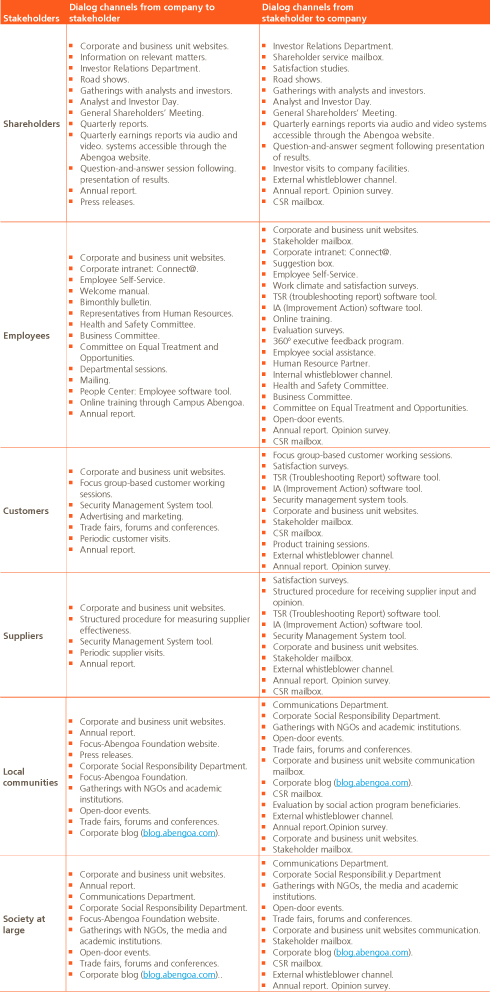 Abengoa
Abengoa
Annual Report 2010
CSR helps the company generate distinctive capabilities by building a network of cooperative relationships based on trust with employees, customers, suppliers, the communities where the company operates, and society at large.
For Abengoa, stakeholder confidence is key to successfully meeting the challenges the company faces in a society in flux and, therefore, these stakeholders must always be taken into account when making decisions. The value of a company today largely depends on its ability to meet the needs of its stakeholders.
Abengoa is aware of the importance of generating a relationship based on trust with its stakeholders and therefore, in addition to providing them with continuous, transparent and accurate information on the activities conducted, the company endeavors to encourage dialog with each of its stakeholders through the different communication channels tailored to the particular characteristics of each stakeholder, while at the same time developing other new channels as it pushes towards an enriching and dynamic process for both parties.
Dialog, understood as a process of listening and communicating, is an essential part of integrating stakeholder expectations into company strategy.
Abengoa’s main stakeholders are its employees, customers, suppliers, investors (given that the company is listed on the stock exchange), the communities where it operates, and society as a whole. Abengoa’s commitment to each and every one of them is the product of ongoing, straightforward and direct dialog, which the company has fostered and nourished for years.


Dialog Channels
To facilitate and foster a well-balanced process, Abengoa employs a wide range of channels for listening and communicating. These channels are aligned with the needs and expectations of each and every one of the stakeholders mentioned above.
The most prominent channels are listed in the table below:

For Abengoa, the dialog channels listed above constitute an ideal instrument for ensuring the mutual exchange of information with stakeholders. In 2010, the company developed two new communication tools for its stakeholders to directly express their opinions to the company: The external whistleblower channel, which serves as a vehicle to report any potential irregularities, incidents involving non-compliance or conduct that violates the ethics, legality and norms governing the company; and the opinion survey, which is a companion to the online edition of this report, and enables readers of this document to bring to the attention of the company their opinion on the contents treated herein.
Some of the dialog channels Abengoa makes available to its stakeholders are managed directly by the heads of the departments involved through their customary ongoing stakeholder rapport. However, the ultimate aim is for all opinions, suggestions, considerations and complaints received on a daily basis by Abengoa interlocutors to have a bearing on company strategy. Therefore, all information is carefully analyzed, and the conclusions reached are addressed throughout the organization.
Abengoa maintains fluid communication with all of the stakeholders involved in each company project and initiative so that all of them feel a sense of belonging, which is beneficial to everyone concerned.
Abengoa participates in many scientific, technological and cultural events held in the areas, cities or regions where it conducts its business; bearing in mind that, in general terms, any activity that may be considered as lobbying is not handled directly by Abengoa, but rather through support for the different professional associations that exist in each of the sectors of Abengoa’s business groups. In the United States, for example, our company engages in lobbying through the following profesional associations: Cornerstone Government Affairs, Renewable Fuels Association, Association of Nebraska Ethanol Producers, Association of Missouri Ethanol Producers, and the Kansas Association of Ethanol Producers.
During 2010 there have been no contributions to political parties or institutions related to them.
In short, the dialog channels in place, and which Abengoa promotes among its stakeholders, aim to create a cross-cutting improvement model to address all stakeholder expectations in keeping with the company’s vision and mission.

United Nations Global Compact
In 2002, Abengoa signed the United Nations Global Compact, an international initiative aimed at achieving voluntary commitment from the business community to social responsibility by implementing ten principles based on human rights, labor and environmental standards, and anti-corruption efforts.
The 10 principles of the Global Compact
Principle 1. Businesses should support and respect the protection of internationally proclaimed fundamental human rights within their sphere of influence.
Abengoa has undertaken in its labor practices the Universal Declaration on Human Rights of the United Nations and aligns professional conduct with all of its protocols, in addition to international agreements approved by said international body, as well as the International Labor Organization (ILO) on social rights. Abengoa also adheres to the ILO Tripartite Declaration of Principles Concerning Multinational Companies and the ILO Social Policy, as well as the OECD Guidelines for Multinational Companies.
Principle 2. Businesses must make sure that they are not complicit in human rights abuses.
All Abengoa companies have standardized selection processes and supplier control and follow-up mechanisms. Since June 2008, Abengoa requires that all of its suppliers sign a Social Responsibility Code (SRC) based on the principles of the Global Compact and inspired by the SA8000 Standard. Through adherence to this code, the company promotes responsible social and environmental practices among its suppliers.
In addition, Abengoa is currently working on the development of a Corporate Social Responsibility-related risk assessment system at company facilities, as well as a single provider verification model for all group companies.
Principle 3. Businesses should uphold freedom of association and the effective recognition of the right to collective bargaining.
Through an open atmosphere of ongoing dialog, Abengoa supports the free association of its workers and considers this an inalienable right.
Principle 4. Businesses should support the elimination of all forms of forced and compulsory labor.
Abengoa condemns all forms of forced labor and child exploitation, and supports any and all initiatives aimed at elimination thereof. The company’s internal norms (NOC), which are mandatory and accessible to all Abengoa employees, set down the company’s hiring policies and guidelines, as well as Abengoa employee procedures and working conditions, all of which are intended to ensure work effectiveness and a suitable personal and professional life balance.
Principle 5. Businesses should support the abolition of child labor.
Abengoa condemns all forms of child labor, in accordance with the terms specified under Convention 138 of the International Labor Organization (ILO) concerning minimum age.
Furthermore, in the Supplier Social Responsibility Code, a mandatory requirement for Abengoa suppliers, a stipulation was added to include the prohibition of child labor as a contracting condition and a specific requirement to comply with the norms of the International Labor Organization.
Principle 6. Businesses should uphold the elimination of discriminatory practices in employment and occupation.
Abengoa will neither accept nor abide any action that entails discrimination of candidates in any hiring process due to race, color, sex, religion, political opinion or any other kind, nationality or social background, economic or birth status, and upholds a policy of equal pay for equal work. Abengoa’s policy on non-discrimination is explicitly reflected in the company’s internal regulations (NOC), which apply to the entire company and which are known by and mandatory for all Abengoa employees.
In addition, Abengoa’s Equality Plan materialized in 2008, and in 2009 a specific work harassment whistleblower protocol was put in place to deal with any potentially discriminatory situation within the company.
Principle 7. Businesses should support a precautionary approach to environmental challenges.
Through an open atmosphere of ongoing dialog, Abengoa supports the free association of its workers and considers this an inalienable right.
Principio 8. Businesses should undertake initiatives to promote greater environmental responsibility.
Abengoa, committed from its inception to sustainability and the struggle against climate change, integrates into the attainment of its business goals a policy focusing not only on its products and services contributing to sustainability, but on achieving these goals in a sustainable manner, contributing to economic progress, social equity, and conservation of the environment. Abengoa’s Greenhouse Gas Inventory quantifies the emissions derived from products and services acquired from third parties, promoting among its providers environmentally-friendly practices. Furthermore, the Sustainable Business Award, the winner of which will be announced in 2011, was created at the end of 2010. This initiative is aimed at publicly acknowledging Abengoa suppliers which, through their performance and conduct, have made an active contribution to sustainable development.
Principle 9. Businesses should encourage the development and diffusion of environmentally-friendly technologies.
Abengoa is an international company that applies innovative technological solutions aimed at sustainable development in the energy and environmental sectors to generate energy from the sun, produce biofuels, desalinate sea water and recycle industrial waste, while bringing long-term value to its shareholders through a management model based on encouragement of the enterprise culture, social responsibility, transparency and rigor.
Principle 10. Businesses should work against corruption in all of its forms, including extortion and bribery.
Abengoa’s most powerful tool for fighting corruption is its Code of Professional Conduct, which governs the acts and working relations of Abengoa’s employees, directors and board members with all stakeholders. Failure to comply with this code may result in termination of the working relationship. This document not only prohibits all forms of corruption, including extortion and bribery, but also demands the highest standards of honor and ethical conduct, and includes procedures for dealing with conflicts of interest between personal and professional relationships; requires suitable disclosure in the reports which Abengoa must present on a regular basis to administrative bodies; requires compliance with applicable laws, standards and regulations; addresses improper use or poor application of assets and businessopportunities; demands maximum confidentiality and fair treatment both inside and outside of Abengoa; and demands immediate internal communication of any failure to comply with the code, as well as appropriate disclosure of any illegal conduct.
In 2010, Abengoa implemented an external whistleblower channel, complementing the internal channel already in place, which serves as an instrument for addressing any potential irregularity, non-compliance, or conduct in violation of the ethics, lawfulness and norms governing the organization.
Since 2005, Abengoa has been publishing an annual progress report on the Global Compact website, where the company reports to its stakeholders on the developments in implementing the 10 principles, underscoring the year-to-year goals and objectives set.

